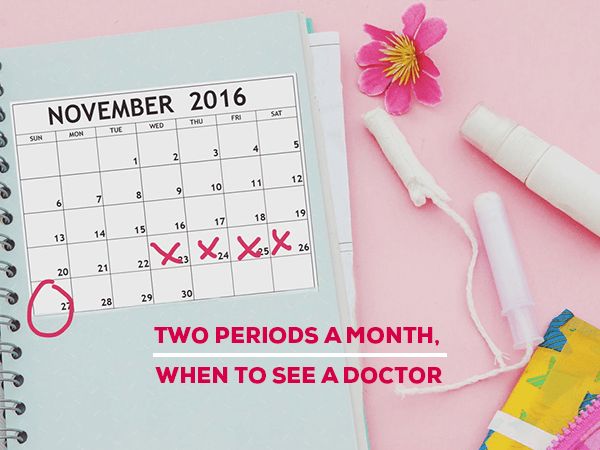It’s normal for adult women to have a menstrual cycle that ranges from 21 to 35 days, and for teenage girls to have a cycle that lasts 21 to 45 days. But every woman is different, and each person’s cycle can vary from month to month. For instance, during some months your cycle may last for more or fewer days than the previous month, or it may start earlier or later than it has before. Sometimes, you may even have two periods in a single month.
If your cycles are on the shorter end of the spectrum, you could have your period at the beginning and end of the month with no reason for concern. But if you experience bleeding outside of your normal menstrual cycle and suspect you’re having a second period, the first thing you should do is figure out if it’s spotting or menstrual bleeding. After you’ve determined if you’re having spotting or menstrual bleeding, you can start to explore what may be causing your increased bleeding.
Causes of a shorter cycle
If your cycle suddenly becomes shorter, it could be due to any of the following:
- Anovulation (lack of ovulation)
- Hyperthyroidism
- Onset of menopause
- Puberty
- Uterine fibroids or cysts
- Stress
- Extreme weight loss or gain
- Birth control
- Illness
Conditions that cause extra bleeding
If you usually have a regular cycle, a change in your cycle, such as suddenly having two periods in a month, could indicate a medical condition. Some health conditions cause bleeding that can be mistaken for a period.
- Pregnancycan cause spotting. Spotting during pregnancy can be normal, but you should tell your doctor about any bleeding during pregnancy.
- Sexually transmitted infectionscan cause discharge and bleeding.
- Miscarriagecan cause heavy bleeding. If you suspect you’re pregnant and begin to have bleeding similar to a period, call your doctor.
Risk factors
If you have a family history of fibroids, cysts, or early onset menopause, you’re at an increased risk for having two periods in a month.
You should make an appointment with your doctor if you:
- experience pain in your lower abdomen that doesn’t go away after a couple of days
- have heavy periods
- spot or bleed in between periods, which is often mistaken for two periods in a month
- find sexual intercourse painful
- have more menstrual cramping than normal
- notice dark clots during your period
Treatment
Your treatment will depend on the underlying cause of your frequent bleeding. If you naturally have shorter cycles or if you’ve recently started menstruating, you won’t need treatment. If anemia is a concern, your doctor may recommend iron supplements.
One possible treatment for periods that occur too frequently is hormonal birth control. This type of birth control can help regulate your periods and help resolve anemia issues caused by heavy bleeding.






,